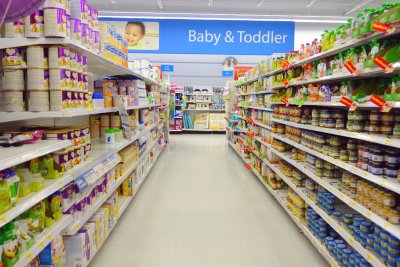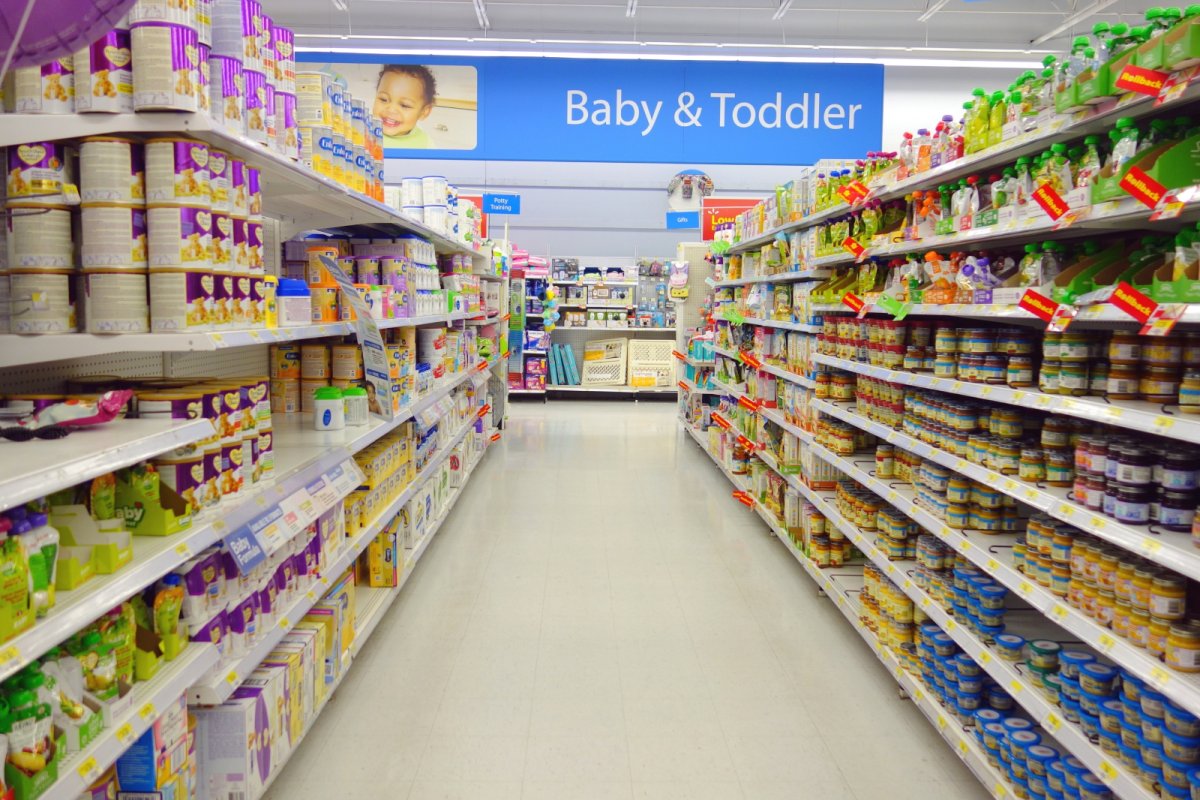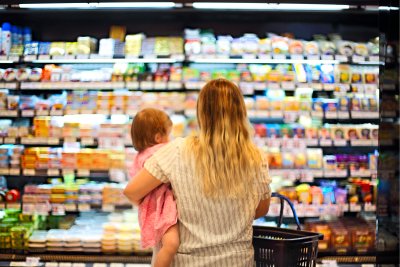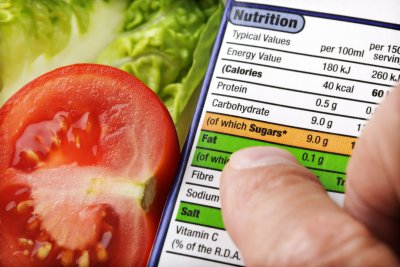 Baby and toddler food selection in a supermarket. Copyright: ValeStock | shuttterstock
Baby and toddler food selection in a supermarket. Copyright: ValeStock | shuttterstock

New government guidance on healthy baby food issued
The government has issued new healthier food standards for baby food manufacturers and retailers, as part of a drive to give babies the best start in life, telling companies they have 18 months to improve or face mandatory regulation. Children's Food Campaign responds.
The new guidance from Department for Health and Social Care focusses on improving products targetted at babies and toddlers up to 36 months. It has been published following consultation as well as growing concern about both the nutritional composition of baby foods and the misleading marketing tactics of companies selling them.
The guidelines will be voluntary, but the government has also announced that baby food manufacturers will be given 18 months to reduce levels of sugar and salt in products, pushing them to change recipes without use of sweeteners. The guidance also requires companies to make their labelling clearer and less confusing, to support parents and carers in making more informed shopping decisions.
Sustain's Children's Food Campaign Manager Barbara Crowther says:
"It's absolutely critical to get nutrition right in the first years of a child's life, and current regulation is out of date and inadequate. This new guidance is a step in the right direction, and effectively puts baby food companies on a timeline to change both their recipes and product labelling, to stop misleading parents and carers, and to get ready for potential further legislation.
"However, voluntary guidance alone is not sufficient to deliver a healthier baby food industry. Nutritionists, health experts and parents alike all want to see stronger regulation. The government has now put companies on 18 months' notice, and we urge them to further develop mandatory standards aligned with World Health Organisation expert recommendations, and create a level playing field for the whole baby food sector."
The Commercial Baby Food and Drink: Voluntary Industry Guidance includes recommendations on:
- reducing levels of free sugars in all commercial baby food and drink products
- not permitting any added salt in any meals or snacks
- reduce the amount of fruit puree products and limit use of fruit puree as an ingredient
- support babies to shift from purees to more textures eg. mashed, lumpy and finger foods as soon as possible after 6 months
- label foods in line with guidance to move children to solid foods from 6 months (not below)
- honest labelling so product names are not misleading and reflect the primary ingredients of the product
- have clear feeding instructions (eg feeding with a spoon, not from spout of a pouch)
- stop labelling and marketing snack products as being suitable for 12 months or under, as babies up to 12 months do not need snacks.
Launching the new guidance, Public Health Minister Ashley Dalton said:
"Every child deserves a healthy, happy start to life. But babies’ development is being harmed by poor diets and unhealthy food, holding them back and piling up pressure on the NHS.
Too often, parents are bombarded with confusing labels disguising unhealthy foods packed with hidden sugars and salt.
Our Plan for Change will tackle this, giving parents the information they need and providing children with good nutritious food.
I’m determined to make it far easier for parents to keep their children healthy. From working with influencers to get children exercising, to banning junk food ads near schools - our 10 Year Health Plan will help kids today be part of the healthiest generation of children ever."
Responses from Sustain member organisations:
Dr Vicky Sibson, Director at First Steps Nutrition Trust says:
"These voluntary guidelines are a first step towards clamping down on the longstanding and widespread poor practices of the baby food industry. These practices mislead parents and undermine their best efforts to feed their babies and toddlers healthy, age-appropriate diets.
"We welcome the DHSC plans to evaluate all aspects of the guidelines 18 months from now. We also fully support their commitment to taking ‘further measures’ in the event that this voluntary measure fails. Recent research recommends stronger mandatory regulations, rather than voluntary guidelines, and these have strong public backing. The most appropriate measure would be to create new legislation to replace the current outdated baby food regulations from 2003.
"There is a ready made tool from the WHO that can inform this process, called the Nutrient Profiling and Promotion Model. We just need the political will to put the health of babies before political interests.
"In the meantime, recently updated NHS guidelines caution against relying on shop-bought baby and toddler foods and remind parents that home-prepared foods are often healthier and cheaper. It is vital that parents are given more support to feed their children diets based on nutritious minimally processed foods, as this will give them the best start in life."
Dr Hannah Brisden, Head of Policy and Advocacy at the Food Foundation, says:
"Giving every child the best start in life begins with good nutrition. Today’s announcement on commercial baby foods highlights the need to protect families from aggressive marketing and end misleading claims on sugary products. Our research found up to 43 claims on a single baby snack, despite many being high in sugar.
"The industry has been warned to clean up their act with voluntary guidelines, but to truly protect children, mandatory standards are needed. We urge the government to monitor progress closely and be ready to step in if companies don’t act."
Katharine Jenner, Director of the Obesity Health Alliance, says:
“For too long, commercial baby foods have been promoting high-sugar products disguised as ‘healthy options’, using misleading packaging. These new guidelines put the industry on notice: this practice must end. Making it easier for parents to buy healthier products is a baby step in the right direction – but what’s really needed is a giant leap.
“It should not even be possible to sell baby food that goes against official feeding guidance – and the public agrees, with three in four people supporting a ban on high-sugar baby foods. If the industry fails to act quickly, the Government must step in with mandatory rules to set children up for a lifetime of good health.“
Dr Kawther Hashem, Head of Research and Impact at Action on Sugar, says:
"Our research has consistently shown excessive levels of sugars in commercial baby foods. Today’s announcement is a welcome recognition that more must be done to protect parents and children from baby foods unnecessarily high in sugars and misleading marketing.
"These long-overdue voluntary guidelines are a step in the right direction, but they must not be the final word. Consuming too much sugar on a regular basis means children are taking in excess calories that, if not used for energy, are stored as fat. This increases the risk of weight gain, and if it starts early, that excess weight is often carried into adolescence and adulthood – raising the risk of overweight, obesity, and agonising tooth decay.
"If we’re serious about protecting our youngest children, these guidelines must be made mandatory. We urge the government to closely monitor progress and act swiftly if companies fail to change.”
Eddie Crouch, hair of the British Dental Association, says:
“There’s progress here but industry will continue to play fast and loose with voluntary guidelines. It’s not enough to challenge manufacturers to reduce sugar levels, we need to force their hand.
“Ministers can help prevent tooth decay and obesity among our children, but they have to go further and faster.”
Children's Food Campaign: Campaigning for policy changes so that all children can easily eat sustainable and healthy food.
Sustain
The Green House
244-254 Cambridge Heath Road
London E2 9DA
020 3559 6777
sustain@sustainweb.org
Sustain advocates food and agriculture policies and practices that enhance the health and welfare of people and animals, improve the working and living environment, promote equity and enrich society and culture.
© Sustain 2026
Registered charity (no. 1018643)
Data privacy & cookies
Icons by Icons8







